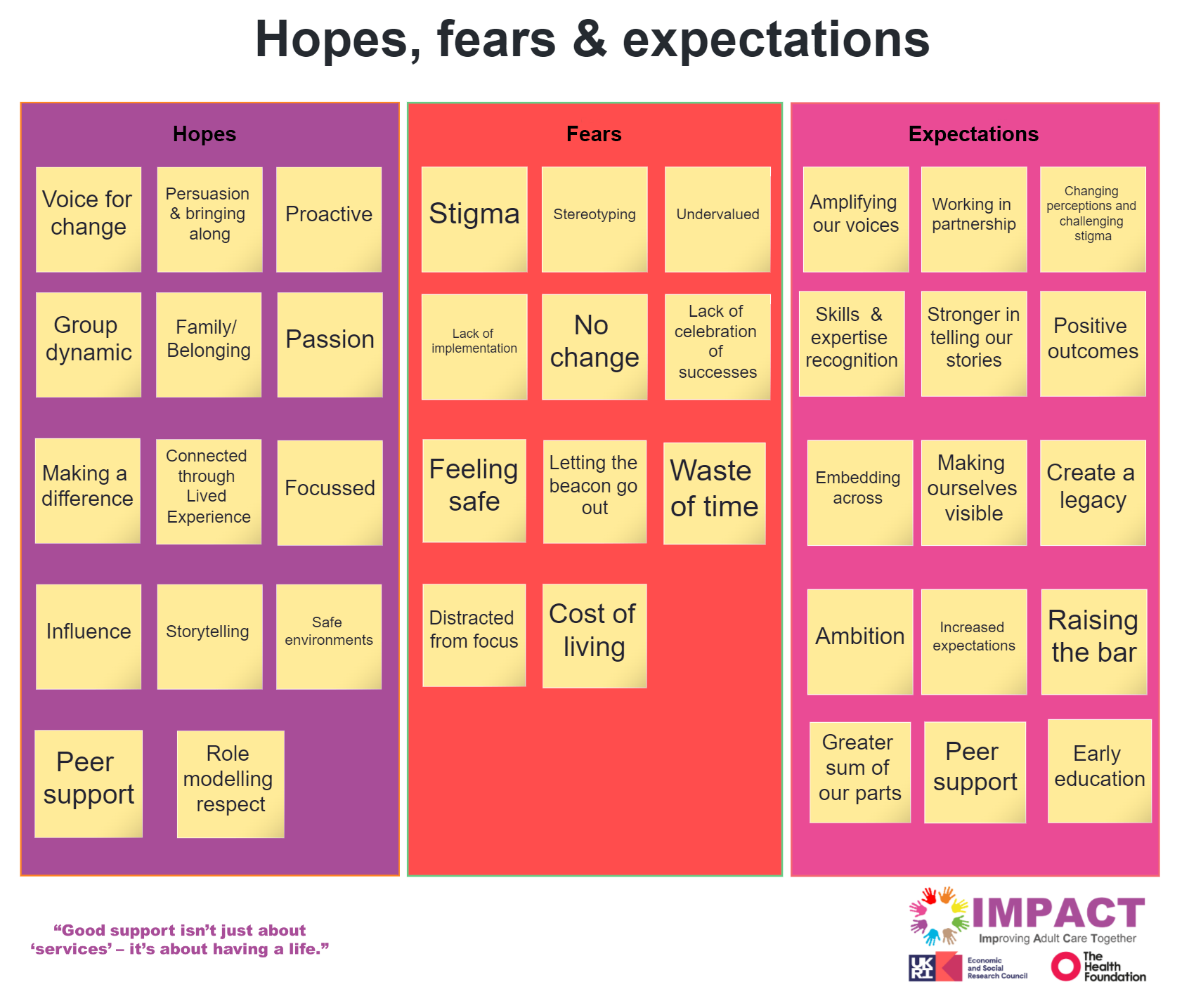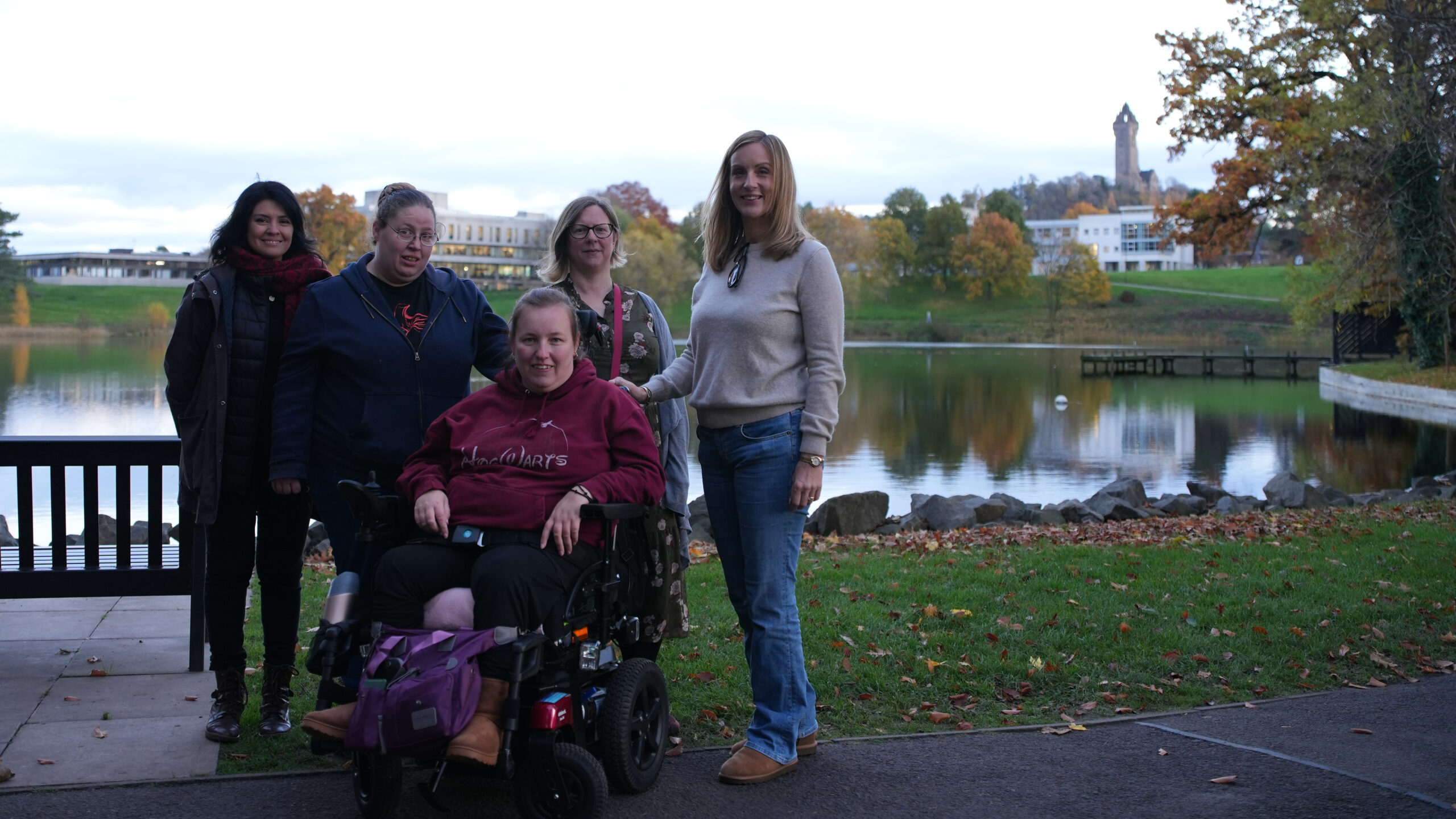IMPACT’s Co-Production Approach 
What is co-production?
IMPACT defines co-production as ‘people who draw on care and support and carers working with professionals in equal partnerships towards shared goals.’
IMPACT’s co-production approach means that people who draw on care and support and carers will be meaningfully involved. IMPACT will make proactive efforts to ensure that all activities are as inclusive and accessible as possible.
Firstly, this will lead to better decisions that are closer to the realities of people’s lives. Secondly, it will also help to readdress traditional power imbalances between people who draw on care and support, carers and professionals, ensuring that IMPACT’s work delivers real improvements to people’s lives. As a result, all aspects of IMPACT’s work will be co-produced, including organisational design, governance, delivery models, how IMPACT defines evidence, and how IMPACT is monitored and evaluated.
IMPACT has incorporated IMPACT Assemblies, Critical Friends, and a Co-production Advisory Group to support effective co-production.
Principles
IMPACT has adopted Social Care Institute for Excellence’s (SCIE) four co-production principles:
Equality – everyone has assets
Co-production starts from the idea that no one group or person is more important than anyone else and everyone has skills, abilities and time to contribute. Equality supports this by going beyond legal definitions to achieve a level playing field so that everyone involved has equity with each other.
Diversity
Co-production should be as inclusive and diverse as possible. To do so, particular efforts will be taken to include people who are diverse in more than one way and people from seldom-heard groups
Accessibility
Making everything accessible is the way to ensure that everyone has an equal opportunity to participate fully in an activity in the way that suits them best.
Reciprocity – mutual benefit
This means people get something back for putting something in. IMPACT rewards people who draw on care and support and carers who co-produce by paying fees and expenses. It comes from the more equal relationships that develop between people and organisations. The development of new skills, shared knowledge and new networks are examples of the reciprocal benefits of this approach.
Model
IMPACT has adopted Social Care Institute for Excellence’s (SCIE) jigsaw model as a framework for implementing and reporting on co-production. For it to work effectively, change will need to happen in each piece of the jigsaw.
Culture
Organisations’ cultures are the beliefs and values that shape them and the way they work. To co-produce, IMPACT will need to:
- develop its culture so that co-production runs through the whole organisation and everything it does
- build the culture on a shared understanding of what co-production means, how it is done and will be achieved
- have leaders that support co-production
- make the culture risk-aware rather than risk-averse
- focus on outcomes which benefit people who draw on care and support
Structure
IMPACT’s structure and systems will need to:
- involve people who draw on care and support and carers from the start
- value and reward everyone who takes part
- ensure there are resources to cover the cost
- have a plan to make sure that everyone is able to communicate with each other
- build on existing structures and resources
Practice
IMPACT and its staff will support this practice by:
- making sure that everything in the process is accessible to everyone taking part
- ensuring people who draw on care and support and carers have the information, support and resources they need to be a meaningful part of co-production and decision-making
- providing training for people who draw on care and support and carers in co-production and any other skills/knowledge they will need
- making sure that staff have everything they need to work using these approaches including time, training, resources and flexibility
- providing any support needed to ensure the community involved has the capacity to be part of the process
- co-producing the planning, commissioning and monitoring of services
- co-producing the recruitment of staff and leaders
Review
IMPACT will need to monitor its processes and outcomes by:
- regularly reviewing that co-production is making a real difference and that the process is following the agreed principles
- co-producing these reviews and evaluations
- using the findings from review processes to refresh co-production and support continuous learning.
Co-Production Advisory Group
There are 10 members in the advisory group. The members all draw on care and support either directly, indirectly, or as unpaid carers. They are supported by our Lived Experience Engagement Lead, Karen McCormick.
Its mission is to develop, support, monitor, and review IMPACT’s co-production activity. They will produce an annual report for the Leadership Team, highlighting:
- progress made during the year,
- areas of good practice,
- and areas for further development.
The members want to have a meaningful opportunity to participate on an equal basis and inform the future direction of IMPACT. They also wish to connect with other lived experience stakeholder groups.




